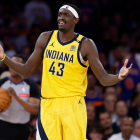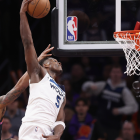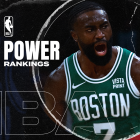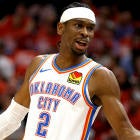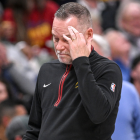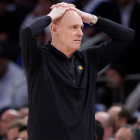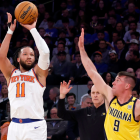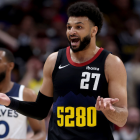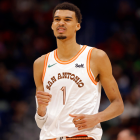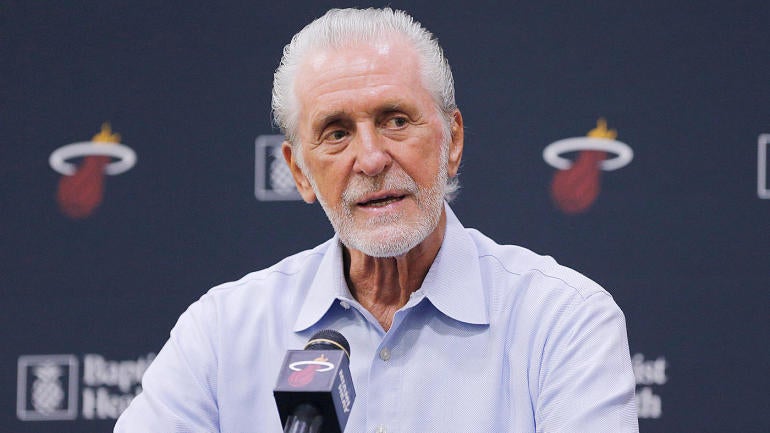
At the end of the Miami Heat's exhilarating, exhausting and extraordinary run in the bubble, Jimmy Butler said they would get better. The Los Angeles Lakers had beaten them in six games in the NBA Finals, but their franchise player pledged that they'd learn from it.
"We'll be back," Butler said. "That's what we're all saying in that locker room. We got guys that want to do it. We got guys that already want to get back in the gym and get to working at this thing. That's what we do here."
Recent history suggests this is easier said than done. In 2009, Dwight Howard's Orlando Magic took down LeBron James' Cleveland Cavaliers in the Eastern Conference finals, but, like these Heat, their season ended with a loss to the Lakers in Orlando. Howard told reporters it would "make me even hungrier to get back to the Finals."
The Magic haven't returned, and, until this year, neither had Howard. Eleven years later, in his second stint with Los Angeles, as a member of James' supporting cast, Howard told Sports Illustrated that he still thinks about that missed opportunity every day.
In 2011, the Dallas Mavericks did what this year's Heat couldn't: defeat James' heavily favored team in the Finals. In the offseason, however, they decided not to run it back. Defensive anchor Tyson Chandler left for the New York Knicks, and the Mavs' big acquisition, Lamar Odom, was a full-fledged disaster. Owner Mark Cuban would later explain that they saw the lockout-shortened 2011-12 season as a throwaway for their aging roster, so they decided to maintain their financial flexibility.
Dallas had its sights set on Howard, and it wanted either Chris Paul or Deron Williams to run the team. None of those dreams came true, and the Mavericks more or less flailed around until Luka Doncic's arrival. Since the title, they have not made it past the first round.
In 2012, the Oklahoma City Thunder stormed onto the game's biggest stage, where they lost to James' Heat in five (mostly extremely close) games. Many analysts chalked it up to inexperience and framed it as a necessary step for a team on its way to many more Finals appearances. Four months later, they traded James Harden to the Houston Rockets. They haven't been back.
For this year's Heat, it wouldn't be so bad to be the Magic or the Thunder. Much was made of Orlando letting Hedo Turkoglu walk in free agency after losing to the Lakers, but its offensive rating actually rose with Vince Carter in his place. To this day, JJ Redick maintains the 2010 team was better, even though it lost in the conference finals. Oklahoma City also remained contenders, and it improved on both ends statistically in its first post-Harden season. If not for Russell Westbrook's knee injury that year, Serge Ibaka's calf injury in 2014, Kevin Durant's foot injury in 2015 and Klay Thompson's fireball show in 2016, it might have won a championship.
The good news is that the Heat are not the veteran-heavy Mavs. Bam Adebayo is 23, Tyler Herro is 20 and Duncan Robinson is 26. Butler, 31, is two years younger than Dirk Nowitzki was. They do, however, have similar choices to make: Goran Dragic is a free agent, like Chandler was then, and the front office has to decide how important it is to maintain financial flexibility.
As of February, that was extremely important. Miami was close to adding Danilo Gallinari at the trade deadline, but wouldn't jeopardize its 2021 cap space to do so. Pat Riley explained that it had a two-year plan. "We are committed to winning and getting back into contending for a world championship. We will get players and what we need in the next year or two," Riley told reporters about a month before the hiatus.
The Heat made the Finals ahead of schedule, and they surely would prefer to remain in the title mix next season. If keeping their books clean in 2021 -- when Giannis Antetokounmpo headlines the free-agent class -- is still the priority, they could theoretically still bring the band back, but their options would be limited.
As The Athletic's John Hollinger noted, they could try to re-sign Dragic, 34, and Jae Crowder, 30, on one-year contracts (or "one-plus-one" deals, which feature a non-guaranteed second year and can be helpful for trade purposes), but stay under the luxury tax so they can use the full mid-level exception on a free agent. (Hollinger suggested going after Paul Millsap.)
This makes sense, as long as Dragic and Crowder are on board with the plan and Miami is still comfortable with making Adebayo, who is eligible for an extension this offseason, wait until restricted free agency for a long-term contract. But what if Dragic would prefer a longer deal on a lower salary? What if one of the better 2020 free agents, like Gallinari or Fred VanVleet, expresses interest in the Heat? They could get to around $21 million in cap space by renouncing Dragic, Crowder, Derrick Jones Jr., Meyers Leonard, Solomon Hill and Udonis Haslem.
Before the bubble, Miami's position seemed simple: It would all but certainly limit itself to internal and incremental improvement in between now and the 2021 offseason. Now, the calculus is more complex. If the Heat can meaningfully improve by cutting into their cap space, there are compelling arguments to do so. Their Eastern Conference competition will be looking for reinforcements, and the Brooklyn Nets plan to join the party. Miami proved last summer that it doesn't even necessarily need cap space to add a star free agent.
Beyond all that, if Butler and Adebayo are its cornerstones, perhaps it should be aggressively pursuing a Bradley Beal- or Jrue Holiday-sized upgrade, rather than focusing on the back-to-back MVP. Antetokounmpo might be a longshot, anyway.
The Heat are in an enviable spot, especially considering they spent the post-James, pre-Butler years mired in varying degrees of mediocrity. They have a roster that just made the Finals, featuring several players who are still developing, and they have options. Miami's front office, however, knows exactly how hard it is to win a title, and while the 2009 Magic, 2011 Mavericks and 2012 Thunder are useful points of comparison, it doesn't even need to look outside its own organization for history lessons. The Heat thought they'd get more than four years with James, and even this season they were both beneficiaries (no home-court advantage in the playoffs) and victims (injuries to Adebayo and Dragic in the Finals) of circumstances beyond their control.
When you have a legitimate chance to win a championship, you typically do everything in your power to maximize it, without much regard for long-term flexibility. Miami's situation, though, is anything but typical. There is no right answer on what comes next, just a bunch of difficult choices.














